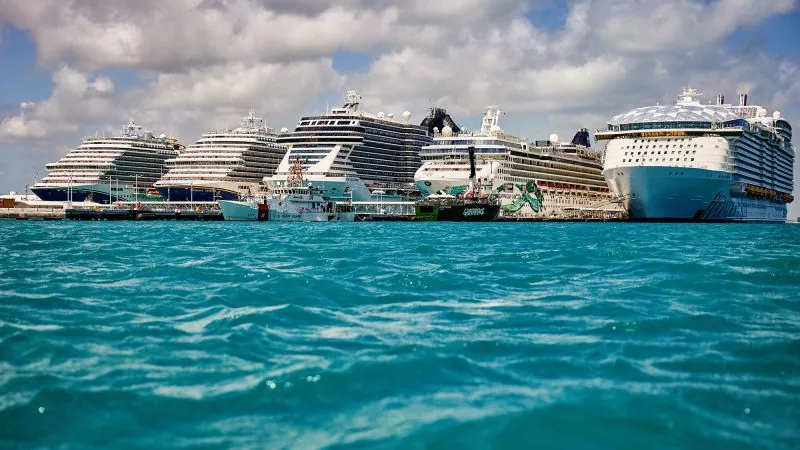
Alarming Rise in Gastrointestinal Outbreaks on Cruise Ships: What You Need to Know
2025-01-03
Author: Kai
Norovirus Takes Center Stage
The CDC data reveals that the majority of these outbreaks are attributed to norovirus, a highly contagious stomach virus. Particularly concerning is the report from December 2024, where five different cruise ships, including those from Cunard Line, Holland America, and Princess Cruises, saw hundreds of passengers struck down with symptoms. When the CDC identifies an outbreak, it means that 3% or more of passengers and crew have reported gastrointestinal issues.
Norovirus has earned a notorious reputation as the 'cruise ship virus' for its ability to spread swiftly in densely populated environments. Dr. William Schaffner, an infectious disease expert from Vanderbilt University Medical Center, highlights that the virus can be transmitted with just a minimal number of viral particles, making close quarters like cruise ships particularly susceptible to outbreaks.
A Challenging Season
This season's spike in cases is noted to be 'more severe' than typical, with outbreaks not only affecting cruise ships but also homes, schools, and other crowded venues across the United States. On average, about 19-21 million cases of norovirus illness occur annually in the US, according to CDC estimates.
While norovirus is still the leading cause of gastrointestinal outbreaks on cruise ships, health experts raised concerns after instances of salmonella and E. coli were identified in separate outbreaks on Royal Caribbean and Silversea Cruises in 2024.
A Closer Look at the Numbers
In total, the CDC reported 16 gastrointestinal outbreaks on cruise ships throughout 2024, the most significant number seen in more than a decade. This compares to 14 reported outbreaks in 2023, suggesting a noteworthy trend upwards. However, a CDC spokesperson stated that while this uptick is concerning, it's unclear if it represents a long-term shift or simply a return to pre-pandemic levels.
The years 2020-2022 saw a significant decline in outbreaks due to the global cruise industry shutting down during the pandemic; prior to that, the rates of gastrointestinal illnesses had been consistently decreasing from 2006 to 2019.
Enhanced Precautionary Measures
The CDC emphasized that outbreaks are typically reported more swiftly on cruise ships than on land, thanks to stringent reporting protocols. Passengers are urged to assist in curbing the spread of illness by reporting any symptoms promptly and adhering closely to hygiene recommendations. Regular handwashing, especially after using the bathroom and before meals, is strongly advised.
Cruise lines are also ramping up their cleaning protocols and implementing quarantines for affected individuals to manage these outbreaks effectively. Dr. Schaffner notes that despite these efforts, norovirus's contagious nature poses significant challenges.
Staying Safe on Your Next Cruise
As the wave of norovirus remains unpredictable, what can prospective cruise-goers do to protect themselves? Here are some expert tips: 1. **Stay Home if You’re Sick**: If you have any illness symptoms, it’s best to postpone your trip. 2. **Follow Hygiene Instructions**: Make sure to adhere to all hygiene protocols on board. Dr. Schaffner emphasizes that traditional soap and water are the most effective against norovirus, as alcohol-based sanitizers may not eliminate the virus effectively.
As travelers set sail into what many expect will be a vibrant cruising season, vigilance regarding gastrointestinal illness must remain a top priority. For a hassle-free vacation, ensuring health and safety should be at the forefront, allowing all to enjoy their ocean adventures without fear of illness.



 Brasil (PT)
Brasil (PT)
 Canada (EN)
Canada (EN)
 Chile (ES)
Chile (ES)
 Česko (CS)
Česko (CS)
 대한민국 (KO)
대한민국 (KO)
 España (ES)
España (ES)
 France (FR)
France (FR)
 Hong Kong (EN)
Hong Kong (EN)
 Italia (IT)
Italia (IT)
 日本 (JA)
日本 (JA)
 Magyarország (HU)
Magyarország (HU)
 Norge (NO)
Norge (NO)
 Polska (PL)
Polska (PL)
 Schweiz (DE)
Schweiz (DE)
 Singapore (EN)
Singapore (EN)
 Sverige (SV)
Sverige (SV)
 Suomi (FI)
Suomi (FI)
 Türkiye (TR)
Türkiye (TR)
 الإمارات العربية المتحدة (AR)
الإمارات العربية المتحدة (AR)